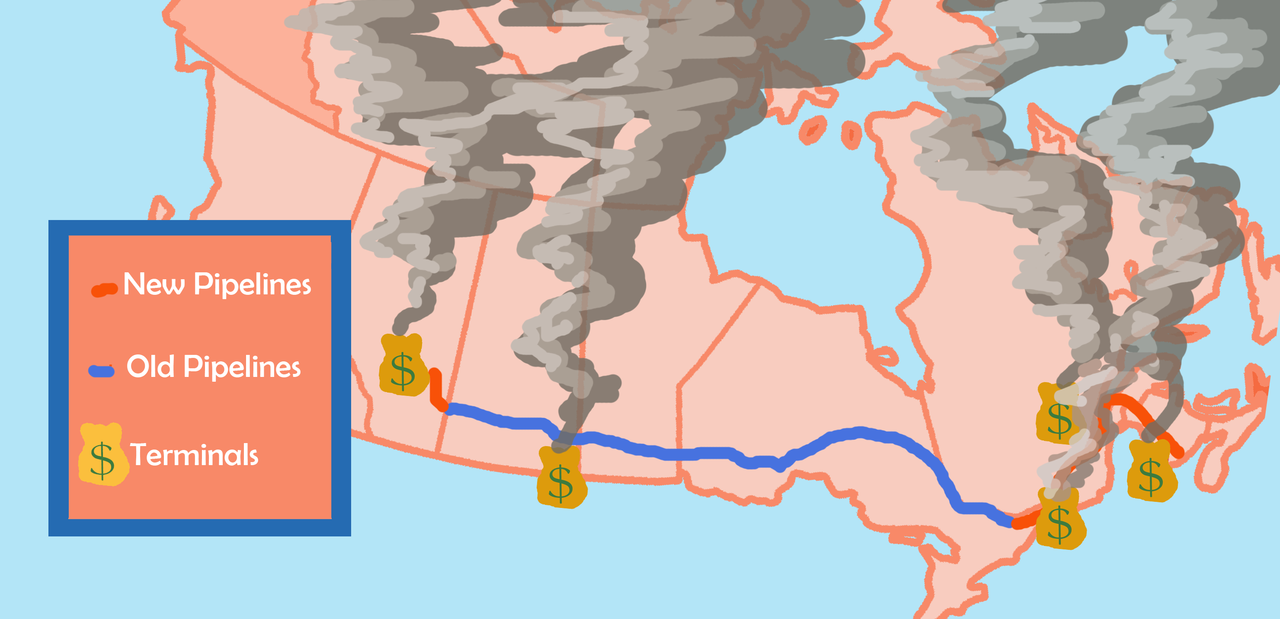Canada’s decision between the extraction of natural resources and saving our land
The Energy East pipeline project is causing conflicts in towns and cities that will be affected by TransCanada’s nation-long pipeline proposal—Montreal being one of them.
The pipeline proposal has reemerged storylines of environmental concerns clashing with corporate interests.
In Montreal, protesters delayed the Aug. 29 Energy East hearings held by the National Energy Board (NEB) until further notice. The hearings, which were scheduled to last all week, were set up for commissioners of the NEB to gain an understanding of the public’s opinion towards the Energy East proposal. The report would then be forwarded to TransCanada to rework issues the public has with the pipelines.
“In the last five years or so—with climate concerns, indigenous rights and sovereignty issues and all these social issues—pipelines have become a lot more controversial,” said Kristian Gareau, a protester at Montreal’s Energy East hearing and a Concordia Masters student in the Individualized Program (INDI). He added that he believes the pipeline project is not fit for today’s reality.
Gareau said he believes some of the population are already dissatisfied with TransCanada’s pipeline project—including environmentalists, scientists and farmers. “On top of that, you see some of these secret meetings that took place with [NEB and former Quebec premier] Jean Charest who is a paid TransCanada lobbyist,” he added. This scandal is a great ammunition for protesters such as Gareau who claim there is a bias within the required NEB report, which must report on the public’s opinion on Energy East at the end of the public consultation process.
“The NEB is supposed to be impartial and issue recommendations in the public interest,” said Alex Tyrrell, leader of the Green Party of Quebec and Environmental Sciences student at Concordia. He said many residents believe the NEB cannot continue with hearings for TransCanada because it has become clear that at least two of the three commissioners tasked with overseeing the hearings and writing a report on public interest concerning the Energy East pipelines have already been promoting it.
Gareau describes the NEB as a powerful entity, stating that as a commissioner or board member there is a responsibility to provide a fair and natural balanced review on public opinion towards pipelines. However, Gareau believes—in regards to meetings between Charest and two of the three commissioners—it is difficult for the NEB to form an unbiased report. “There’s kind of a revolving door between industry and the NEB, so the cultures and interests of the oil and gas industry are very much entrenched in the NEB,” said Gareau.
Tyrrell said the NEB initially denied meeting with Charest. However, once it was revealed the meetings did take place, the NEB was then ordered to admit the meetings had occurred and to release notes taken during the meeting, said Tyrrell. The published notes revealed that the commissioners and Charest discussed how to spin the NEB report in a way that would gain support from Quebec residents. “Their job isn’t to do public relations, it’s to do safety and environmental analysis,” Tyrrell said.
Tyrrell added people should be trained specifically to evaluate these projects on behalf of government organizations and anyone involved in the energy industry due to their loyalties to energy companies should not be hired. “They’re supposed to be evaluating the project on behalf of the citizens,” said Tyrrell. He said it should not be on behalf of TransCanada or on behalf of people who are fixated on prolonging the life of the oil industry to continue its existence into the future.
Tyrrell said similar circumstances led to catastrophes like the BP oil spill in the Gulf of Mexico. “The regulators were far too close with the industry and lacked the teeth to really do anything— even when problems were well known,” said Tyrrell.
There are also concerns about the safety and reliability of TransCanada’s plan. Of the 4,550 km of proposed pipeline for this project, approximately 75 per cent of those pipelines will be converted from old gas transmission lines, according to Energy East pipeline spokesperson Tim Duboyce.
Tyrrell said this proposal is problematic. “Not only are the pipes already aged and worn, but they were never designed to carry tar sands oil in the first place,” he said, adding that alterations to existing natural gas pipelines increase the probability of spills.
Duboyce said there are a series of pipelines that cross the Prairies through Northern Ontario. The pipeline splits as some of the pipelines head to the Greater Toronto area, while others continue east towards Ottawa and then South from there.
The new section of the pipeline would run from Iroquois, Ontario and up across the Ottawa river, said Duboyce. In Quebec, the pipeline would cross the North Shore towards Laval and connect with the Suncor Energie refinery. “It would travel beneath the St. Lawrence river about 100 meters below the bedrock in a concrete tunnel we’re going to build adjacent to an existing pipeline that actually crosses the St. Lawrence,” Duboyce said. The pipeline would reach the Valero refinery located in Lévis, Q.C., continuing east towards New Brunswick and then on to St. John’s, N.B. where it will be attached to a marine export terminal.
While TransCanada says the pipeline will give both Quebec and Canada an economic advantage, critics to the pipeline say the advantages of a pipeline like Energy East are, at best, short term.
TransCanada advertises that Energy East will generate a large amount of employment. “During the development and construction phase of the project, Energy East will support, on an annual basis, 14,000 full-time direct and spinoff jobs across the country,” said Duboyce. He said among 14,000 of the full time jobs stated, Quebec employment represents an average of 3,100 full-time direct and spinoff jobs annually during a nine year development and construction period.
However, as Tyrrell points out, the development and construction period will only last nine years, resulting in the predicted high employment rates being limited to that timeframe.
“They claim 14,000 jobs for the overall project … but those are just construction jobs. It’s really short-term,” said Tyrrell. “Once the pipeline is built, even TransCanada will tell you—there’s only 33 permanent full-time jobs in Quebec.”
Tyrrell said his greatest concern for the proposed Energy East pipelines is the level of development of the tar sands the pipelines will permit, ultimately contributing to Canada having a larger oil industry.
Tyrrell said the oil TransCanada will be transporting through these pipelines is not necessarily for domestic consumption. “Once it’s built it’s going to be in the ground for at least 50 years, and it’s going to tie the entire country into the practice of digging up this inherently unsustainable resource and exporting it to other countries,” said Tyrrell.
Duboyce said TransCanada plans to make Canadian crude oil more competitive outside the US markets and expand into international markets. He also said that Energy East will make it possible for refineries to buy Canadian oil instead of oil from Saudi Arabia and Venezuela.
“One of the key points that gets lost in this conversation … is that there’s only one thing that drives oil production, oil transportation—and that’s oil consumption by people,” said Duboyce.

Duboyce stressed the importance of expanding Canada’s oil industry in order to benefit Canada’s economy. Not only do we use oil to fuel our transportation, but we find oil in our cell phones, computers, some clothing, makeup and chewing gum, Duboyce said. “It’s a pretty important component of the economy.”
However, Gareau strongly disagrees. “It’s economic considerations are very short-term,” he said, adding that the economic prospects of how much the oil currently valued may now be overvalued. “This fossil economy is declining.”
“We need to leave a lot of fossil fuels in the ground,” said Gareau. “How we’re actually going to do that—that’s what we need to be talking about.” He said people need to be discussing 21st century energy and economic opportunities, instead of relying on traditional needs—such
as crude oil. “[The pipeline] also locks Canada into a fossil economy that will be defunct in the next decade or two, putting us that much further behind in the emerging green economy,” said Gareau.
“[NEB is] going to let the companies continue to exploit them anyway and they’re going to get the public and the environment to absorb the risk.” Tyrrell said. “It’s really short term economic gain vs. long term environmental sacrifice—it’s a question of priorities.” Tyrrell said once these pipelines have been built, there will be tons of subcontractors and companies already specialized in fabricating pipelines. “You can export pipeline parts to some other part of the world,” he said. “But chances are, they’re going to want to build another pipeline locally or as close to Montreal as possible.”
“The strategy of the environmental movement is to shut down the tar sands by blocking all of the exit paths,” said Tyrrell. He said the opposition has managed to block the Northern Gateway for the time being, but now it’s time for Eastern Canada to block the Energy East pipeline. Tyrrell said the resistance is going well so far. “The people protesting are not only speaking for themselves, they’re speaking for huge sections of the population—that includes [speaking for] the mayors of hundreds of different municipalities in Quebec.”




